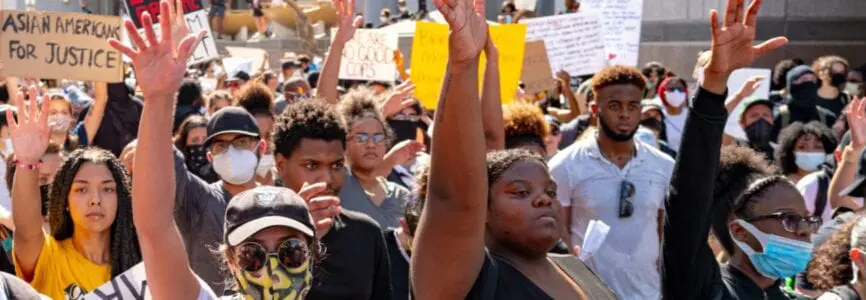BIOETHICS & EQUITY
A Perilous Moment for Our Nation
Mildred Z. Solomon, EdD
President, The Hastings Center
We are at an exquisitely painful moment in the history of our nation. The pandemic, widespread poverty, racial discrimination, even hatred, are tearing us apart and calling on us to find a new way forward. A new way to trust one another.
The United States has a huge, unconscionable gap between the haves and haves-not, as well as enormous differences in the life prospects, and longevity, of blacks and whites. Low-wage hourly workers are barely scraping out a viable existence. Many of our people, alone among the developed world, still do not have access to health care.
Health care workers have demonstrated enormous compassion and courage, yet at the national level we have not been able to build the testing and contact tracing capacity essential for managing the pandemic. Despite improvements in some states, in many other places we seem resigned to a huge number of infections and deaths, disproportionately although not exclusively, among people of color and the old. False dichotomies that pit lives against livelihoods distract us from building the solutions, like widespread testing and contact tracing, that are essential for both our health and our economic wellbeing.
We know what to do. We have known for decades. People deserve a living wage, children require high-quality daycare and public education, affordable housing and health care must be available, public health infrastructure must be rebuilt, and neighborhoods must be safe and walkable. The chance to better one’s life—to be free in the fullest sense of the word —should be available to all. None of this is a pipedream. We are the richest nation on earth. We can organize our society to achieve the necessary conditions for human wellbeing.
The Hastings Center and its visionary founders, Daniel Callahan and Willard Gaylin, sought an unusual balance: their work arose during the civil rights movement and reflected a growing emphasis on individual rights. At the same time, Dan and Will saw perils in unbounded individualism. They called on us to act, not only for self-realization, but also for the common good. They saw that individual flourishing can only happen within the bonds of a caring community.
In this dark hour, we can see important cultural shifts toward a more compassionate, inclusive future. Already there is legislation being drafted to demilitarize local police stations and move some funding from policing to social services. There is growing recognition that hourly wages must rise, and even support in some quarters for a universal basic income, given that artificial intelligence is likely to displace millions of workers. Despite the alarming growth in white supremacist groups, there is ample goodness, compassion and courage among individual Americans. Health care professionals have demonstrated moral courage, beyond what should be expected. White protestors are joining people of color to protest police violence. In a very recent poll, 76% of Americans, including 71% of white Americans, called racism in the United States “a big problem,” which is a 26% increase in that view since 2015. Even the National Football League is changing its tone, declaring that they had been wrong to criticize their players for taking a knee and vowed to do more to recognize racism. Their motives may be economic, but their public declaration is important nevertheless.
If we grasp these glimmers of hope and amplify them, we can choose the moral path. We can build a stronger, more sustainable, more trustworthy society.
In the coming months, the United States must examine the ideas and the structures that have created endemic injustice and suffering and identify new ideas and new structures to put in their place. We at The Hastings Center will begin within our own area of expertise, asking what we and the field of bioethics can do to work for a fairer, safer, and more just nation.
Of course, justice has been a through line in much of Hastings’ work over years, including groundbreaking work on immigrant health and on the housing needs of the poor and the old. Our scholars are astutely attuned to the ways new technologies are inaccessible to the poor. Our publications bring attention to, and suggest strategies for, ensuring fair and affordable access to health and health care. But there is much, much more to do.
In the coming weeks, I will begin a discussion with Hastings Center staff and others in our community about how we can leverage our strengths in research, publishing, and public engagement to help advance a more just society. We will ask how we might reinforce ethical principles, like truth-telling, care, and willingness-to-compromise, that are essential to social cohesion, effective government, robust democracy, and human wellbeing. We will bring thought leaders together to articulate a new vision for our pluralistic society, a vision that must be capable of uniting all of us behind a shared goal of promoting human flourishing and protecting the equal moral worth of all individuals.
We are also deeply concerned about how few people of color work in the field of bioethics. I pledge to work within Hastings, and with colleagues across the country, to strengthen the pipeline for early career minority students who may wish to integrate bioethics into their professional plans.
This is a perilous moment for our country. Nevertheless, we must choose hope over despair. Let us help each other to hope—and to act.

